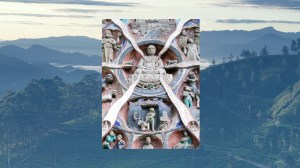In this series

Fatalism in Thailand primarily arises from a Buddhist worldview and belief in karma.
Thai culture, in general, is influenced by Theravada Buddhism. The central tenet of Buddhism is karma, which means “action” or “deed.” However, in its usual sense, it means the fruit of our action. If we do good, we will receive good. If we do evil, we will receive evil. Forgiveness by some deity does not exist. We must reap what we sow.
How does this express itself in Thai thought? Everything we are and everything that happens to us are a result of karma. We deserve everything that happens, whether good or bad. The major aspects of our present lives are predetermined by the events and our choices in a past life.
The word in Thai for “karma” is often used as a curse word. If something bad happens to another person, they will say kaam (กรรม), meaning that person received what he or she deserved.
A very capable and successful blind missionary friend was consistently denied a missionary visa in Thailand. Thai government officials could not accept that a blind man could ever become a “holy” priest of religion. His blindness was proof that he did something horrible in a past life. His blindness was proof that he was a “bad” person.
This is why most orphanages, outreach to prostitutes, and foundations that help the poor or disadvantaged are Christian organizations. Thai people are often merciful, giving, and caring, but their motivation is to earn merit for themselves so that they may be reborn into a more advantageous setting in the next life.
Christianity exists in stark contrast to the fatalistic views of Buddhism. The gospel really is good news to a person from a Buddhist worldview where no hope exists, apart from a continual series of lifetimes struggling to be free from rebirth into a world of suffering and toil.
Many people want to reject the worldview of karma. Karma is bad news. We must save ourselves. We get what we deserve. Our lives are controlled by karma. Abandoning a karmic worldview for belief in a universe where Jesus loves us and is merciful toward us is uniquely transforming.
However, coming out of a fatalistic worldview can be a hindrance to discipleship and Christian growth.
Thai people resonate with this example I use in my seminary classes: Westerners tend to believe they can do anything, even when they cannot. Westerners do not always evaluate themselves realistically. Westerners believe they can do anything or be anyone they desire. They can be rich, successful, or smart if only they work hard enough.
In contrast, Thai people typically believe they evaluate themselves realistically. They are aware of their own strengths and weaknesses. However, after evaluating themselves, they do not believe they can change or grow. Thai people believe that this is the way they are and that they cannot change.
Another challenge is found in how Thai people come to Christ. According to my research, Thai people do so through attraction and power. They see that Christians are different, loving, accepting, honest, and caring. Converts will also relate that they had a supernatural encounter with God of some sort, answered prayer, a powerful experience of God’s presence, a dream, a vision, or deliverance.
After they make a commitment to Christ, some do not yet think of themselves as sinners in need of repentance. That issue can be a problem; however, we must think of conversion not as an event but as a process of discipleship that continues for the believer’s lifetime.
To challenge fatalistic thinking in Thai culture, I look to Psalm 103, a full lesson in the grace and mercy of Yahweh God. Fatalism and karma have no mercy. One is trapped in their situation without hope or remedy. But in Jesus we have hope, salvation, and a future.
Read our contributors’ bios in the series’ lead article, Destiny Is All? How Fatalism Affects Churches Across Asia. (Other articles in this special series are listed to the right on desktop or below on mobile.)



















